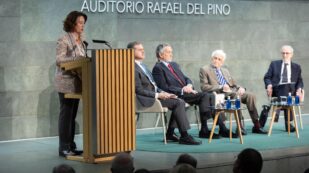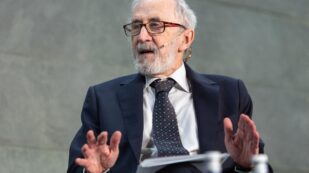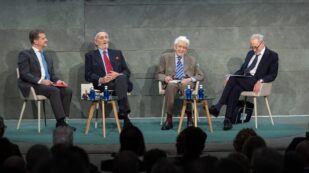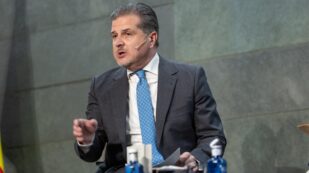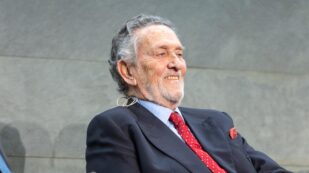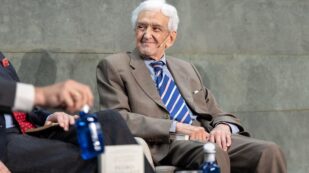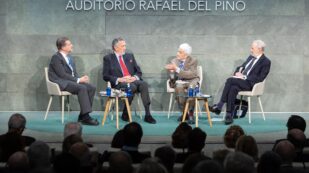Pedro Schwartz, Fernando Schwartz, Thomas Baumert and Francisco Cabrillo
Summary:
Pedro Schwartz and the defence of liberal thought: Reflections from the Fundación Rafael del Pino
On 6 March 2025, the Rafael del Pino Foundation organised an event to pay tribute to Pedro Schwartz on the occasion of the presentation of the book The scars of freedom. This event not only served as recognition of his intellectual and academic career, but also provided an opportunity to reflect on the importance of liberal thought in contemporary society.
Throughout the event, Schwartz and the speakers who accompanied him emphasised the fundamental pillars of liberalism, a way of thinking that has been key to the economic and political evolution of modern democracies. His vision is based on three essential principles: individual freedom, the rule of law and the market economy, elements that have marked his work and his public interventions.
Pedro Schwartz's liberal vision
Pedro Schwartz has been a staunch defender of individual freedom as the basis for a prosperous and just society. During the event at the Rafael del Pino Foundation, his insistence on the importance of limiting the power of the state in order to guarantee the rights and autonomy of citizens was underlined. In his speech, Schwartz recalled that liberalism is not only an economic theory, but a philosophy of life that places the individual at the centre of social development.
- Individual freedom: Schwartz stressed that true prosperity can only emerge when citizens have the right to make their own decisions without arbitrary government restrictions. He argued that the most advanced societies are those that have respected and promoted this freedom.
- Rule of law: One of the key points of his speech was the importance of a stable and predictable legal framework. Schwartz insisted that the law must be applied fairly for all, without favouritism or exceptions, as an essential element for economic and political development.
- Market economy: In his speech, Pedro Schwartz defended competition as a driver of economic growth. He stressed that excessive state intervention generates inefficiencies and limits the capacity for innovation and entrepreneurship, key elements for the progress of any society.
Contemporary challenges to liberalism
The event at the Rafael del Pino Foundation addressed the main challenges facing liberalism in the current context. Schwartz and the other speakers pointed out how the advance of populism, state interventionism and restrictions on freedom of expression have endangered liberal principles.
- Populism and concentration of power: Schwartz warned of the growth of political leaderships that seek to erode democratic institutions in favour of state control. For him, decentralisation of power and respect for individual freedoms are essential to avoid authoritarian drift.
- Economic interventionism: In his speech, he criticised increased public spending and excessive regulation, warning that these policies end up hurting citizens by generating inflation and holding back investment. He pointed out that the best way to ensure social welfare is to allow the market to function with as little interference as possible.
- Freedom of expression and critical thinking: Schwartz defended the need for open and uncensored debate. He stressed that political correctness and the imposition of dogmas have limited the capacity for analysis and the confrontation of ideas, fundamental aspects in a free society.
The legacy of Pedro Schwartz and the future of liberalism
The tribute at the Rafael del Pino Foundation reaffirmed Pedro Schwartz's role as one of the most influential figures in the dissemination of liberal thought in Spain and beyond. His legacy is not only to be found in his writings and lectures, but in his ability to inspire new generations to defend freedom and individual responsibility.
Despite current challenges, liberalism remains a key reference for those seeking to build more prosperous and just societies. As the event highlighted, education and the dissemination of these principles are essential to counteract the advance of interventionist and authoritarian policies.
Pedro Schwartz has demonstrated throughout his life that freedom is not just an ideal, but a real tool for progress. At the event, it was recalled that, in the face of uncertainty and state control, the best response is always more freedom. As he himself has pointed out on numerous occasions, only when the individual is master of his or her destiny can society as a whole prosper.
The tribute at the Rafael del Pino Foundation not only celebrated the figure of Pedro Schwartz, but also reinforced the relevance of his thought. In times when liberal ideas face constant challenges, his legacy continues to be a beacon of reference for those who believe in the transformative power of freedom.
The Rafael del Pino Foundation is not responsible for the comments, opinions or statements made by the people who participate in its activities and which are expressed as a result of their inalienable right to freedom of expression and under their sole responsibility. The contents included in the summary of this conference are the result of the debates held at the meeting held for this purpose at the Foundation and are the responsibility of their authors.
The Rafael del Pino Foundation is not responsible for any comments, opinions or statements made by third parties. In this respect, the FRP is not obliged to monitor the views expressed by such third parties who participate in its activities and which are expressed as a result of their inalienable right to freedom of expression and under their own responsibility. The contents included in the summary of this conference are the result of the discussions that took place during the conference organised for this purpose at the Foundation and are the sole responsibility of its authors.
